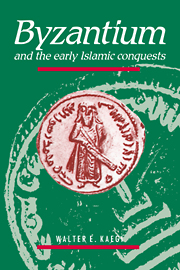Book contents
- Front Matter
- CONTENTS
- List of illustrations
- Preface
- List of abbreviations
- Chapter 1 The problem of Byzantium and the early Islamic conquests
- Chapter 2 The Byzantine Empire in an era of accelerating change
- Chapter 3 Difficulties in devising defenses for Syria
- Chapter 4 The first Muslim penetrations of Byzantine territory
- Chapter 5 Early tests in southern Palestine
- Chapter 6 Problems of cohesion: the battle of Jābiya- Yarmūk reconsidered
- Chapter 7 The brief struggle to save northern Syria and Byzantine Mesopotamia
- Chapter 8 Byzantium, Armenia, Armenians, and early Islamic conquests
- Chapter 9 Controversy and confidence in the seventh-century crisis
- Appendix 1 Author and date of the anti-jewish treatise
- Chapter 10 Elements of failure and endurance
- Bibliography
- Index
Chapter 5 - Early tests in southern Palestine
Published online by Cambridge University Press: 22 September 2009
- Front Matter
- CONTENTS
- List of illustrations
- Preface
- List of abbreviations
- Chapter 1 The problem of Byzantium and the early Islamic conquests
- Chapter 2 The Byzantine Empire in an era of accelerating change
- Chapter 3 Difficulties in devising defenses for Syria
- Chapter 4 The first Muslim penetrations of Byzantine territory
- Chapter 5 Early tests in southern Palestine
- Chapter 6 Problems of cohesion: the battle of Jābiya- Yarmūk reconsidered
- Chapter 7 The brief struggle to save northern Syria and Byzantine Mesopotamia
- Chapter 8 Byzantium, Armenia, Armenians, and early Islamic conquests
- Chapter 9 Controversy and confidence in the seventh-century crisis
- Appendix 1 Author and date of the anti-jewish treatise
- Chapter 10 Elements of failure and endurance
- Bibliography
- Index
Summary
THE DEFENSES OF GAZA AND THE BATTLE OF DĀTHIN
The lack of any coherent Byzantine strategy for the defense of Syria quickly became clear after the Muslims penetrated southern Palestine. The Byzantine military, religious, and civilian authorities were not expecting any major Arab invasions and accordingly had made no special preparations to resist or to prepare the local civilians. Whatever Heraclius or his subordinates intended, the reality was just a poorly informed and an ad hoc Byzantine military reaction, which resulted in disaster.
Southern Palestine experienced some of the most savage early clashes between Byzantines and Muslims. The unfortunate Byzantine military commander who had responsibility for leading those inept and disastrous defensive operations was Sergios, who, as a candidates (office formerly reserved to a personal bodyguard of the Byzantine emperor, but one that had become more honorific and widely distributed in the seventh century; holders wore special white uniforms), had direct access to Emperor Heraclius. The Sergios of the Greek sources is probably identical with the Byzantine commander B[R]YRDN, which is “ Vardan” or “Wardān,” from Damascus mentioned in an early Syriac source. He fell in the battle of Dāthin near (12 miles distant from) Gaza, on 4 February 634.
- Type
- Chapter
- Information
- Byzantium and the Early Islamic Conquests , pp. 88 - 111Publisher: Cambridge University PressPrint publication year: 1992

